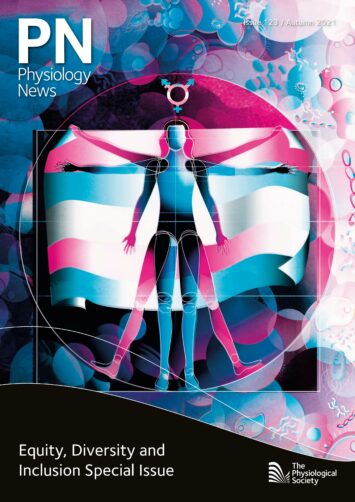
Physiology News Magazine
How can we make the STEM workforce more equitable?
A new report suggests next steps
News and Views
How can we make the STEM workforce more equitable?
A new report suggests next steps
News and Views
https://doi.org/10.36866/pn.123.11
Abigail Hilditch, Policy and Partnerships Manager, British Science Association
In July 2021, the All-Party Parliamentary Group (APPG) on Diversity and Inclusion in STEM published the results of their inquiry into equity in the STEM workforce. The inquiry launched in November 2020 with the ambition to detail the experiences of minoritised STEM workers and shine a light on positive sector-led initiatives and practices. With the resultant report, the APPG has sought to create the opportunity to work with Government, parliamentarians, sector leaders and community stakeholders to recognise the findings and address the historic and systemic disadvantages faced by minoritised groups in this sector.
This report is based on written evidence from over 85 organisations and individuals, four evidence roundtables with over 40 attendees and additional desk research comprising over 150 relevant sources.
The inquiry found inequity in the STEM workforce is widespread for those from minoritised groups and this inequity intersects across ethnicity, gender, disability, sexual identity, where you live and socio-economic status. This inequity has been worsened by the COVID-19 pandemic. The report highlights the following key findings:
1. The STEM workforce is less diverse than the wider workforce but consistent data collection and sharing is lacking.
2. There is a need for the Government to take a multi-pronged approach to drive equity in the STEM workforce.
3. Intersectional barriers continue from STEM education into the workforce.
4. There is awareness of structural inequity in some large STEM organisations, but no consensus on solution.
5. There is already considerable inequity in STEM but COVID-19 is making it worse.
The evidence received shows how barriers appear for every minoritised group along the career pathway – from issues in recruitment and retention, to access to mentors, professional development
and leadership roles.
The result is an overall lack of representation in the STEM sector of minoritised groups such as Black people, women, disabled people and those from the LGBTQ+ community. Worryingly, evidence has shown that the STEM sector is losing valuable skills, experiences and perspectives, and cannot reach its full potential without greater equity in the workplace. As a vital economic sector accounting for 18% of the UK’s total workforce, the STEM sector is critical to the UK’s economic recovery from the pandemic. Evidence detailed in this report shows how diversity and inclusion can improve growth, creating sustainable economic prosperity and opportunities for future generations.
However, the importance of diversity and inclusion in the STEM sector extends beyond the economic imperative, to the intrinsic benefits of equity for societal fairness and success. Addressing the structural issues
of inequity inherent in the STEM workforce will not only combat skills gaps but create a stronger, more innovative and trusted sector.
This report makes three recommendations. In some aspects, it requires a cross-Government approach that is fully engaged with the STEM sector. In other aspects, it requires different portfolio holders to lead on specific policy workstreams. Above all, it asks that all STEM stakeholders use the opportunity of the COVID-19 recovery to lead a “STEM Diversity Decade of Action” to tackle the systemic under-representation of minoritised groups at all levels in the sector.
The report can be accessed online at www.britishscienceassociation.org/appg. For further information, contact the APPG on Diversity and Inclusion in STEM Secretariat at appg@britishscienceassociation.org.
